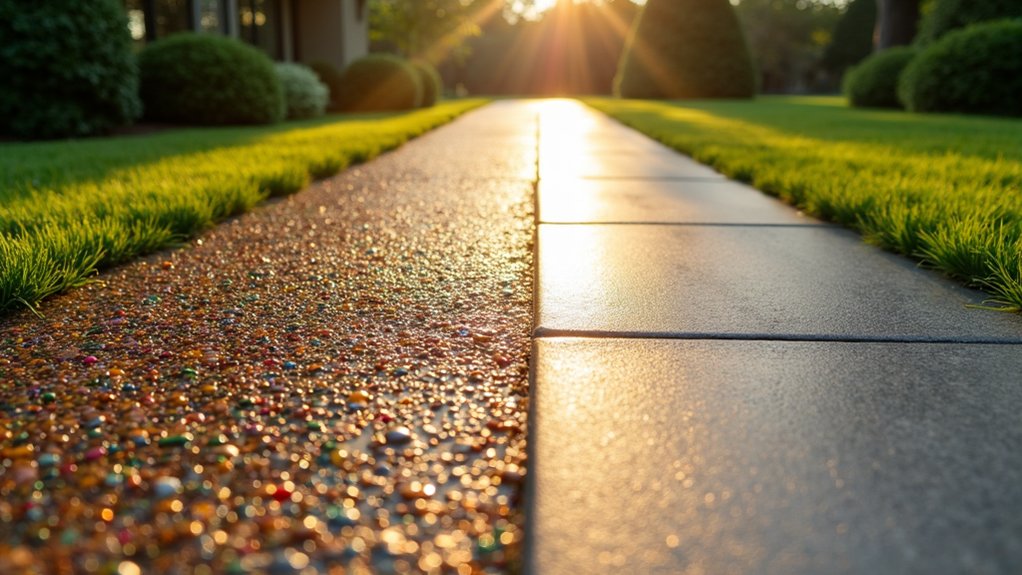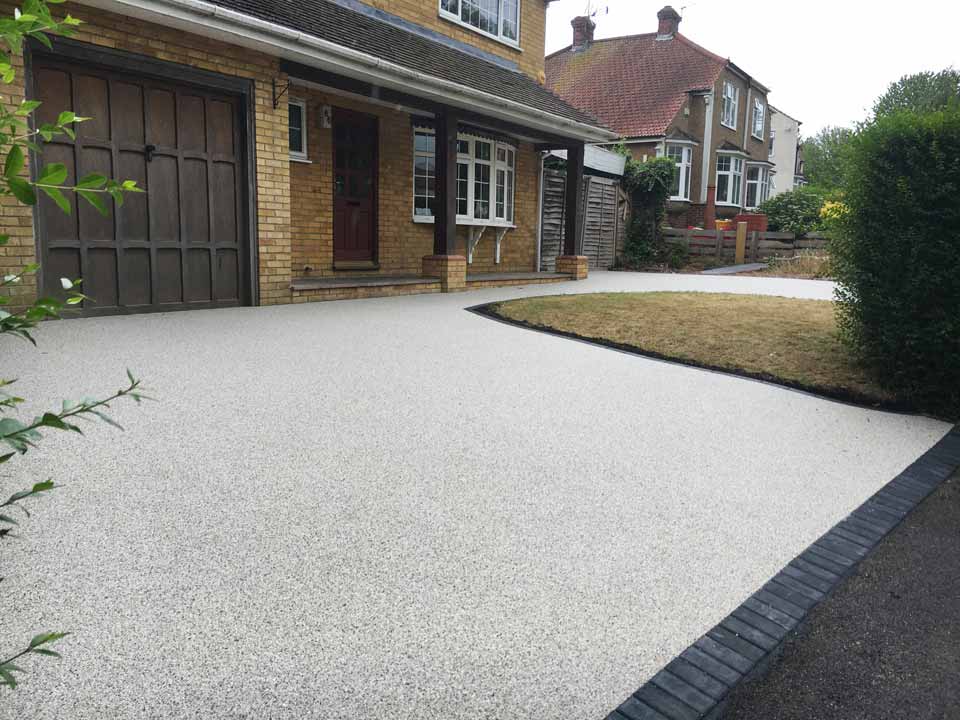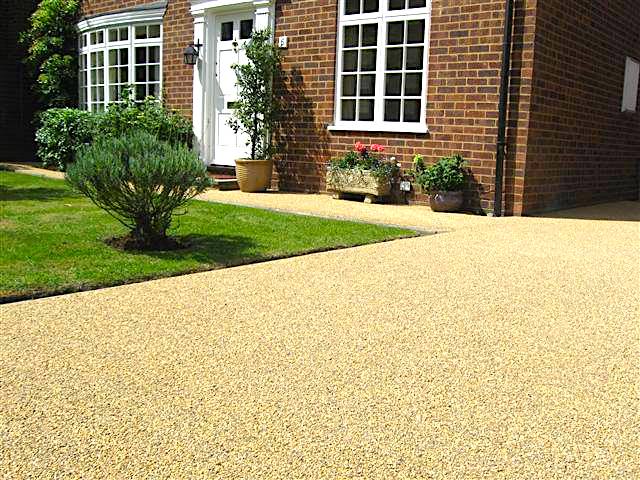When deciding between a resin driveway and a concrete driveway, think about your budget, durability requirements, and design preferences. Concrete is generally cheaper to install but needs more maintenance and has limited design options. For example, while you can only paint concrete in a few colours, resin driveways allow for a wide range of colours and patterns, making them more visually appealing.
On the other hand, resin driveways offer excellent drainage and require less upkeep, making them a worthwhile long-term investment. However, they usually come with a higher initial cost. Weighing these factors will help you make an informed choice that suits your needs best.
Table of Contents
ToggleKey Takeaways
- Resin driveways provide a wide range of customisation options and vibrant designs, whereas concrete driveways tend to have a more traditional look with limited styles.
- While concrete driveways are usually cheaper to install initially, resin driveways can be more cost-effective in the long run due to their lower maintenance requirements.
- Resin driveways are more resistant to weather damage and cracking, while concrete can be prone to issues from freeze-thaw cycles.
- Resin is permeable, helping to reduce flooding risks and comply with Sustainable Drainage Systems (SuDS) regulations, unlike concrete, which may need extra drainage solutions.
- Installation quality is crucial for both types; resin requires skilled tradespeople for proper fitting, while concrete is generally easier to install.
Cost and Affordability
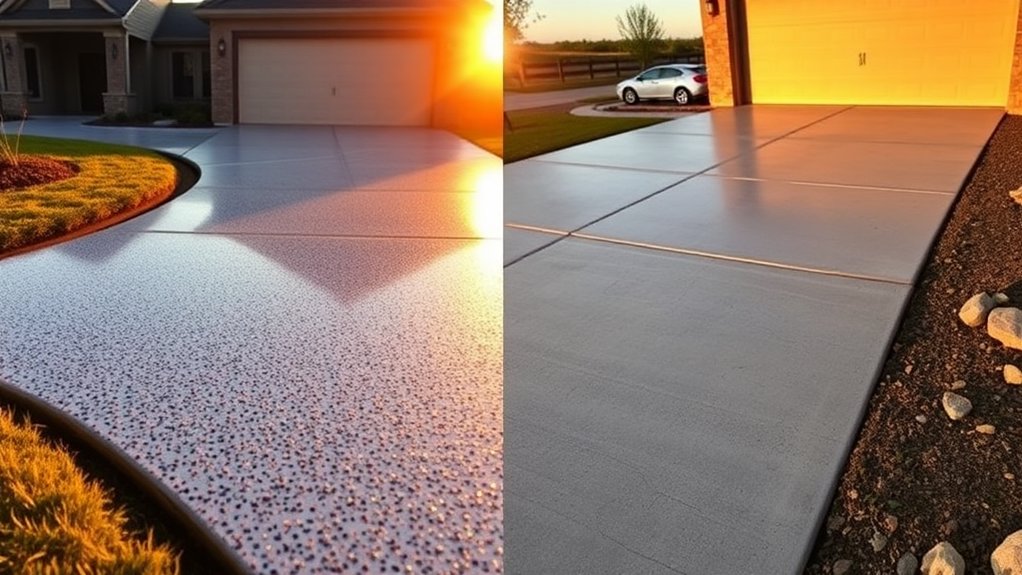
When considering a new driveway, it’s important to understand the cost differences between resin and concrete options.
Resin driveways generally cost between £11 and £17 per square metre, while concrete driveways typically range from £6 to £15 per square metre. Concrete often presents a lower upfront cost, making it a popular choice for those on a tighter budget. However, resin driveways can be more economical in the long run, as they require less maintenance and fewer repairs. Additionally, the cost for a standard 2-car driveway can significantly influence your decision, as it ranges from £4,400 to £9,800 for resin. Proper installation ensures long-term value through durability and low maintenance, making resin a worthy consideration.
Keep in mind that installation complexity can impact prices; resin installations need skilled workmanship, which can increase costs. Ultimately, evaluate your budget and long-term needs to decide which driveway option is the best investment for you.
Durability and Maintenance
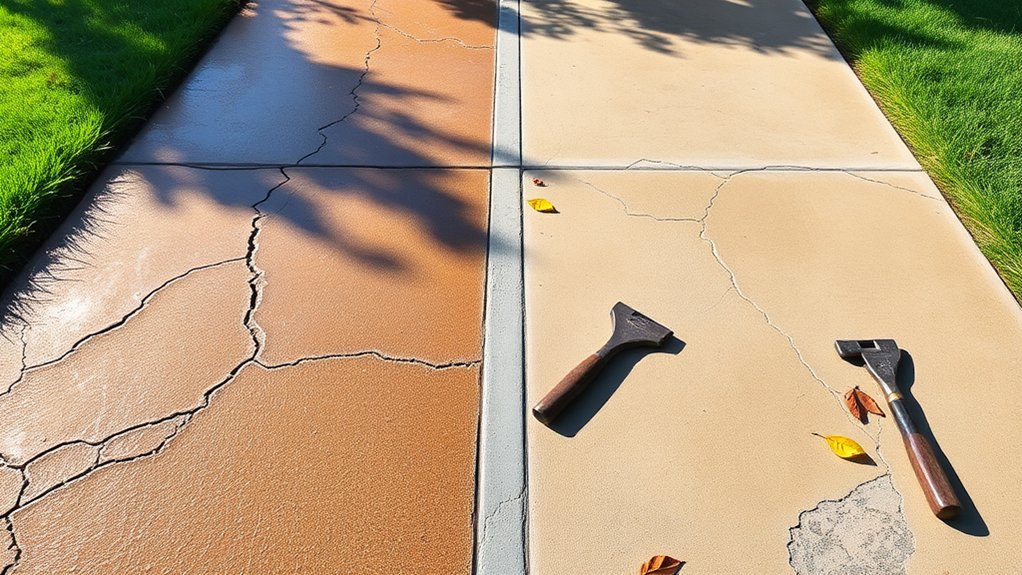
When choosing a driveway, it’s essential to consider both durability and maintenance for long-term satisfaction.
Resin driveways usually last between 15 to 25 years, while concrete can endure for 30 to 40 years, depending on how well it’s cared for. Both materials need regular upkeep to maximise their lifespan. For resin, a simple sweep and occasional gentle wash will keep it looking good. Concrete, on the other hand, should be sealed every 2 to 3 years to prevent moisture damage. Resin’s UV-resistant properties help retain its colour, while concrete can fade without proper maintenance. Additionally, proper installation is critical for ensuring the longevity of both driveway types. It’s also crucial to keep both surfaces clear of debris and standing water to reduce the risk of damage. Understanding these factors will guide you in selecting the right driveway for your needs. Furthermore, the lifetime of resin driveways can be significantly enhanced with proper drainage and ventilation during installation.
Aesthetics and Design Options
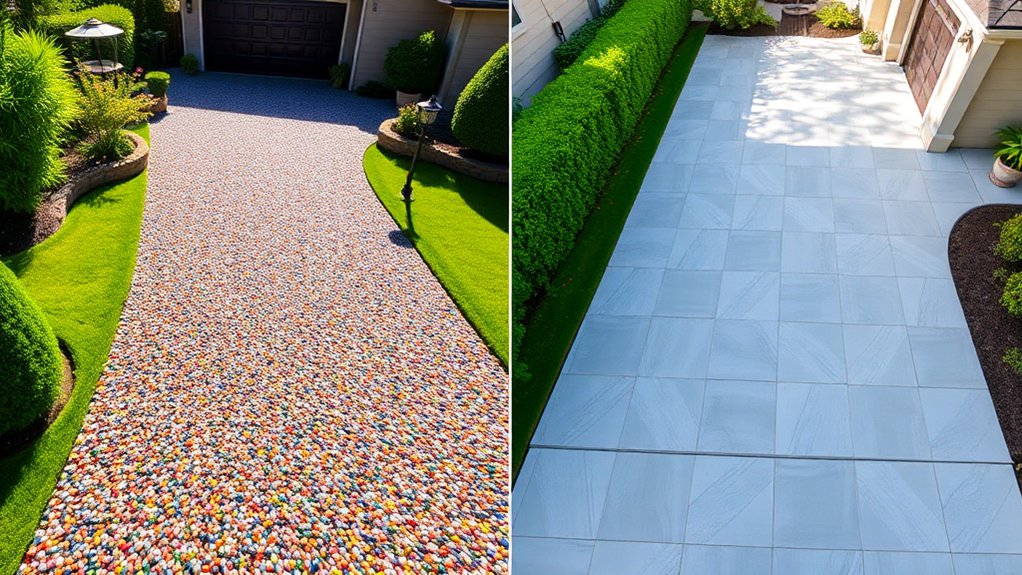
When it comes to aesthetics and design, resin driveways offer a wealth of customisation and a vibrant range of colours to complement any property style. You can achieve classic designs or choose modern, eye-catching visuals with intricate patterns and textures. Additionally, resin driveways are known for their durable material that ensures they maintain their beauty over time. The variety of colour combinations available allows homeowners to create a unique look that matches their personal style. On the other hand, concrete driveways tend to have a more limited aesthetic appeal, offering less opportunity for personalisation and versatility.
Customization and Variety
While both resin and concrete driveways have their practical advantages, resin driveways are particularly notable for their wide range of customisation options and aesthetic appeal.
You can select from various patterns, including bespoke designs that match your home’s style. The colour choices are extensive, allowing you to pick shades that complement your property beautifully.
Additionally, resin can incorporate textures that mimic natural materials like gravel or stone, boosting its visual charm. Eco-friendly features, such as green inlays, increase permeability while adding a unique touch.
In contrast to concrete, which has limited customisation, resin’s installation methods allow for intricate, multi-dimensional patterns. This versatility means you can create distinctive looks that enhance your home’s curb appeal.
In short, resin driveways offer a personalised solution that balances practicality and design.
Timeless vs. Modern Appeal
The aesthetic appeal of driveways significantly impacts a property’s overall look, with concrete and resin offering different styles.
Concrete driveways provide a classic appearance, available in finishes like brushed, stamped, or exposed aggregate. Their neutral tones suit various architectural styles, although they can fade over time.
In contrast, resin driveways offer a modern finish, presenting a sleek and seamless look that stands out. With vibrant colours and unique aggregate blends, they provide eye-catching appeal.
Resin’s flexibility also allows for creative designs, including curves and irregular shapes. While concrete may require more upkeep to retain its charm, resin typically maintains its polished finish longer, making it a popular choice for modern homeowners.
Environmental and Drainage Considerations
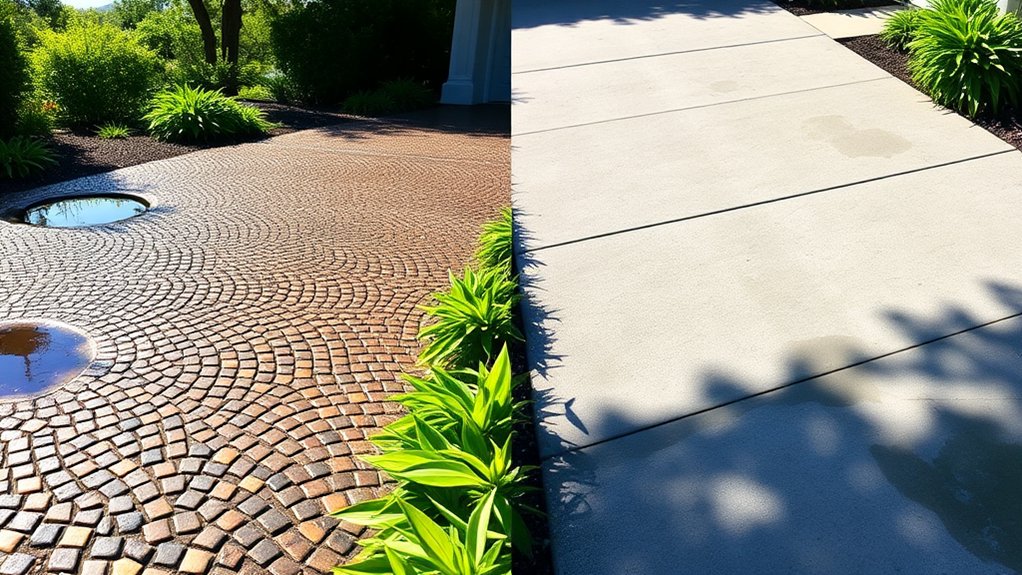
When deciding between a resin driveway and a concrete driveway, it’s important to think about their environmental impact and drainage properties.
Resin driveways are made from recycled materials and are permeable, which means water can pass through, helping to minimise flooding.
On the other hand, concrete driveways are usually non-porous, resulting in increased surface runoff that can harm local ecosystems.
Choosing a resin driveway can be a more sustainable option for your home.
Permeability and Water Drainage
When comparing resin driveways to concrete options, it’s important to consider their permeability and water drainage.
Resin-bound driveways excel in drainage, allowing up to 25 litres of water to pass through each square metre every second. This design helps reduce surface water retention, cutting down on puddles and slipping risks.
On the other hand, traditional concrete driveways are mostly impermeable, which can cause rainwater to run off and increase the risk of flooding. Concrete often requires additional drainage solutions, whereas resin driveways usually meet Sustainable Drainage Systems (SuDS) regulations, offering environmental advantages.
Environmental Impact Comparison
When considering permeability and water drainage, it’s essential to assess the environmental impact of resin and concrete driveways. Resin-bound driveways are generally more sustainable, as they often utilise recycled materials and have a lower carbon footprint. In contrast, concrete production is linked to significant CO2 emissions, which adversely affects its environmental impact. Moreover, the permeability of resin supports groundwater recharge, while the non-permeable nature of concrete can disrupt local ecosystems. Here’s a quick comparison:
| Aspect | Resin Driveway | Concrete Driveway |
|---|---|---|
| Material Sustainability | High (recycled content) | Low |
| CO2 Emissions | Lower | Higher |
| Permeability | High | Low |
| Urban Heat Island Effect | Reduced | Increased |
| Maintenance Frequency | Less | More |
Installation and Practical Use
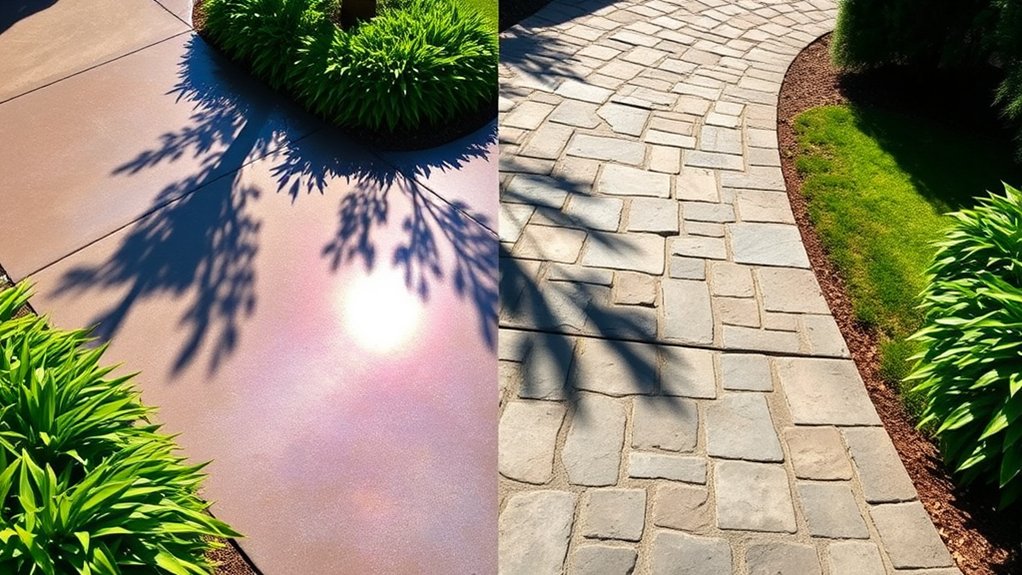
Both resin and concrete driveways are popular choices for homeowners, but their installation processes and practical uses differ significantly.
Resin driveways can be installed quickly, often within just a few days, and they’re ready for use almost immediately. The process involves laying a permeable sub-base and applying a UV-stable resin mixed with aggregates.
On the other hand, concrete driveways take longer to install due to extended curing times. This process typically requires mixing cement, sand, and gravel, which can postpone when you can use the driveway.
In terms of usability, resin provides a smooth, non-slip finish that’s great for both pedestrian and vehicle traffic. Concrete, however, is sturdier and can support heavy loads.
An advantage of resin is its permeability, which allows effective drainage and reduces the likelihood of puddles—making it particularly beneficial in wetter climates compared to concrete.
Fire Resistance and Weather Impact
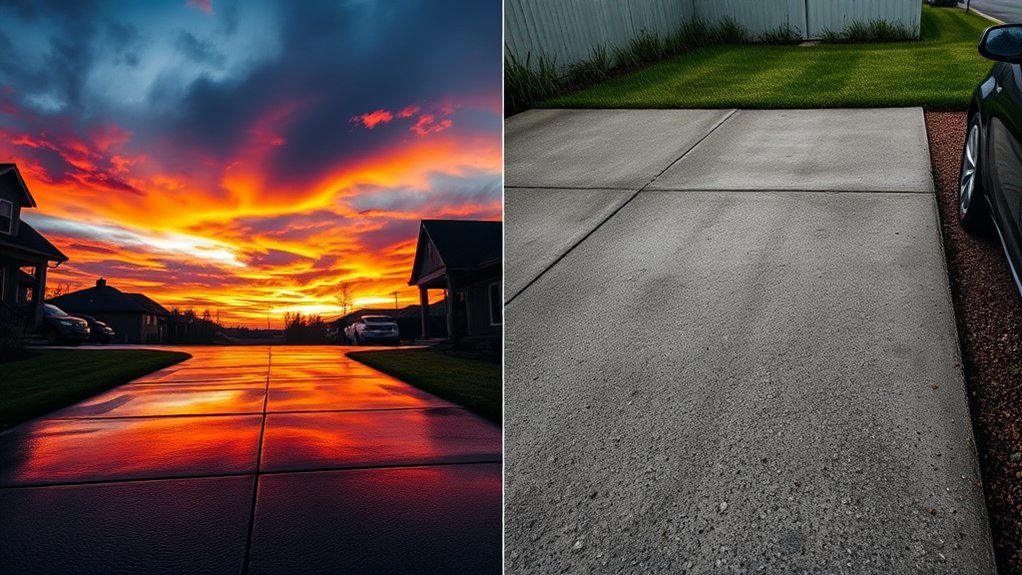
When considering driveway options, fire resistance and weather impact are crucial factors.
Resin driveways are excellent for fire safety, as they use materials that minimise flammability and limit fire spread. Their heat-resistant surfaces help create safe zones around buildings.
In terms of weather resilience, resin systems can endure freezing and thawing cycles without cracking, and they come with additives that prevent colour fading from UV rays.
On the other hand, concrete is non-combustible and provides decent fire resistance, but it can experience freeze-thaw damage and staining over time.
While both materials offer fire safety, resin driveways tend to be more resilient in various weather conditions, making them a preferable choice for many.
Pros and Cons of Concrete Driveways
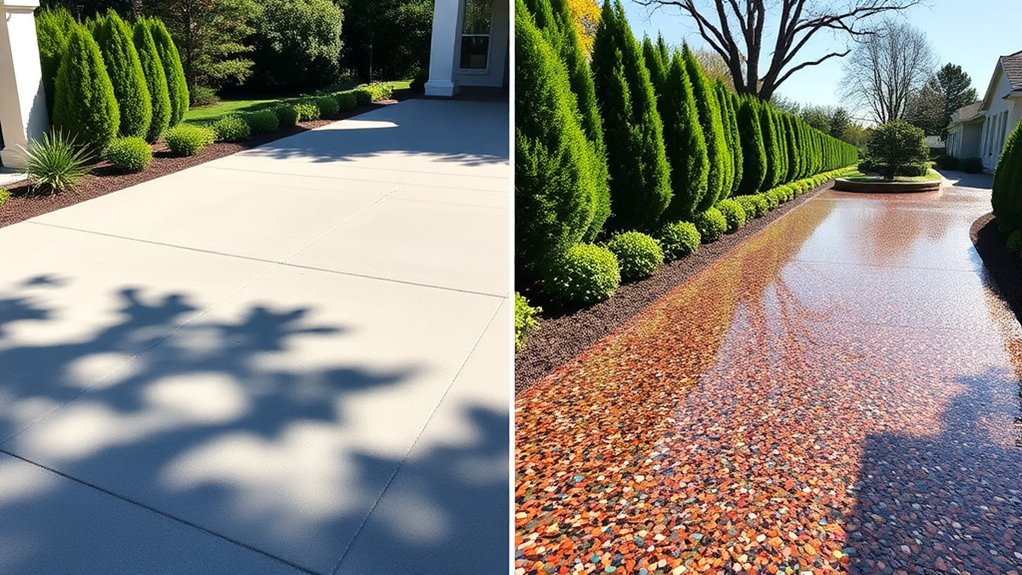
A concrete driveway has both benefits and drawbacks that homeowners should consider carefully.
One major benefit is its durability; with proper installation and maintenance, it can last between 30 to 50 years. This long lifespan can lead to cost savings over time, even though the initial installation costs are higher, typically ranging from £50 to £100 per square metre.
However, regular maintenance is crucial. This includes sealing to prevent stains and cracks, which can be expensive to fix. While concrete can handle heavy loads well, it’s susceptible to cracking from freeze-thaw cycles.
Additionally, the aesthetic options for concrete driveways are somewhat limited compared to other materials, which could impact the overall look of your property.
Pros and Cons of Resin Driveways
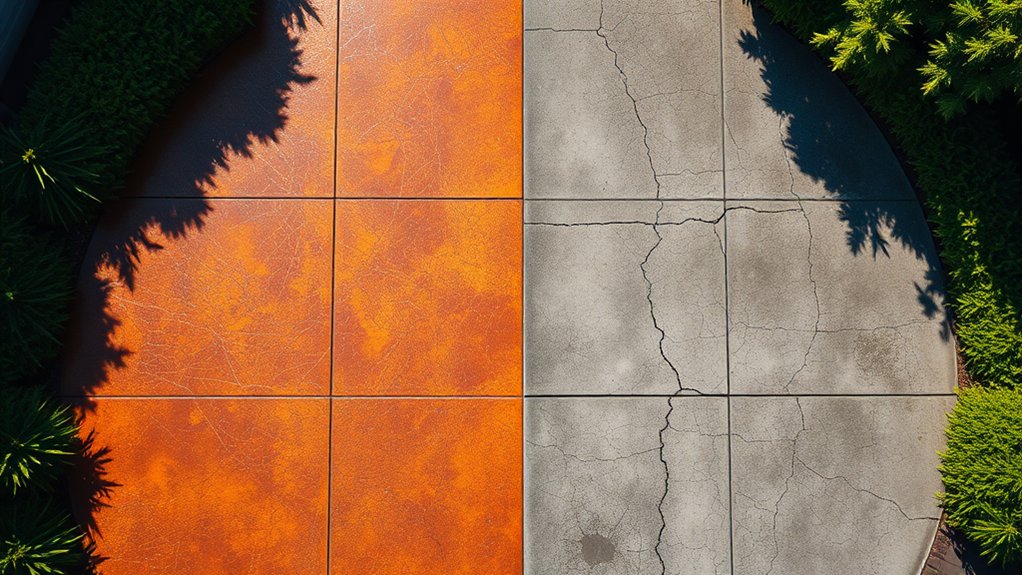
Resin driveways provide a modern alternative to traditional concrete, offering several benefits as well as some drawbacks. One of the main advantages is their durability; resin driveways resist cracking and weather damage, lasting up to 25 years with proper maintenance. Their permeable design allows for effective drainage, helping to prevent puddles.
However, they may not be suitable for heavy commercial traffic, which can lead to damage over time. Maintenance is relatively low, as a simple power wash is usually enough to keep them looking good.
On the downside, the initial installation costs are higher than those for concrete, and if not installed correctly, defects can occur.
While resin driveways can enhance your property’s aesthetic appeal and value, it’s crucial to hire skilled contractors for installation to ensure their longevity and performance.
Weighing these pros and cons is important when making your decision.
Making the Right Choice for Your Property
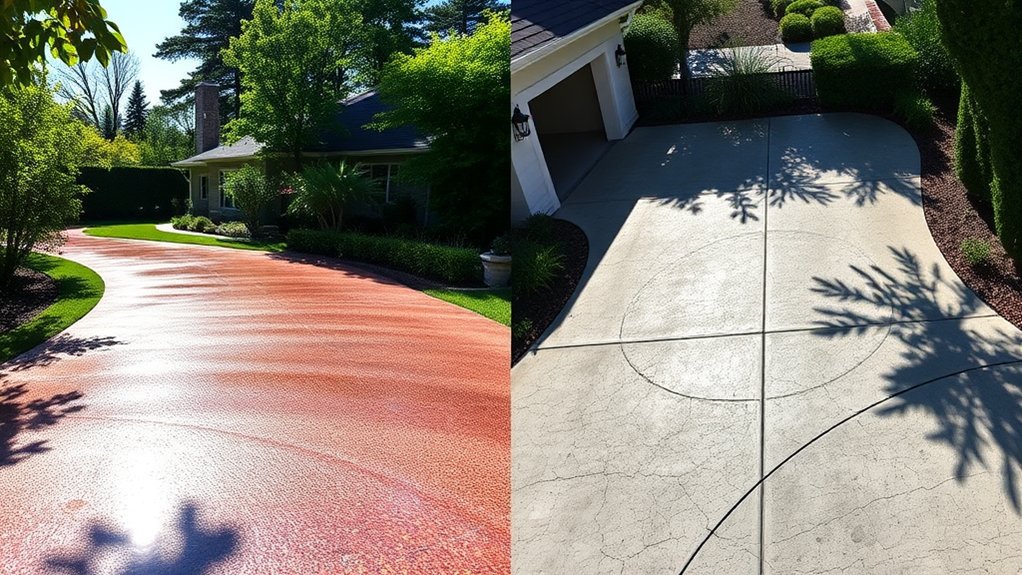
Selecting the right driveway for your home involves several key factors: budget, durability, appearance, and maintenance.
Concrete driveways are typically more affordable to install, making them a popular choice for those on a budget. On the other hand, resin driveways may have a higher initial cost, but they’re a worthwhile long-term investment due to their durability and minimal upkeep requirements.
Installation methods vary as well; concrete is relatively simple to lay, whereas resin requires a professional to ensure proper application and quality.
In terms of durability, concrete can crack under heavy loads, while resin is built to withstand wear and tear with less maintenance.
When it comes to aesthetics, resin offers more design flexibility, which is great for modern homes, whereas concrete provides a timeless look.
Ultimately, consider these aspects carefully to choose the best driveway for your property’s needs.
Frequently Asked Questions
How Long Do Resin and Concrete Driveways Typically Last?
Resin driveways usually last between 15 to 25 years, while concrete driveways can last 30 to 40 years. The durability of each option depends on factors such as the quality of materials used, the installation process, ongoing maintenance, and exposure to environmental conditions. For example, a well-installed concrete driveway in a sheltered location might outlast a resin driveway exposed to harsh weather.
Can I Install a Resin Driveway Over an Existing Concrete Surface?
Yes, you can install a resin driveway over existing concrete, provided you ensure proper surface preparation and priming. This will help achieve a successful resin installation and effective resurfacing. For example, if you have an old, cracked concrete driveway, a resin overlay can rejuvenate its appearance and enhance durability. Just make sure the surface is clean and free from loose debris before starting the process.
Are There Color Options for Concrete Driveways?
Yes, there are various colour options for concrete driveways, ranging from earthy tones to vibrant shades. You can consider methods like integral colouring or acid-based stains to improve the appearance and complement your home’s style.
How Do Temperature Extremes Affect Both Driveway Types?
Temperature changes cause both concrete and resin driveways to expand. However, concrete is around 50% more likely to crack than resin under the same conditions. This is because resin’s flexibility helps it withstand thermal stress, while concrete’s rigidity makes it more susceptible to damage, especially during freeze-thaw cycles. For instance, if you live in an area with harsh winters, a resin driveway may be a better choice as it can handle the temperature shifts without cracking as easily.
What Is the Best Maintenance Routine for Each Driveway Type?
For optimal maintenance, clean resin driveways weekly with a stiff broom and a gentle rinse. Concrete driveways need less regular upkeep; aim to clean them every few months, seal them every 2-3 years, and tackle any stains quickly using suitable cleaning methods to prolong their lifespan.
Conclusion
When deciding between a resin driveway and a concrete driveway, it’s important to consider your specific needs and preferences. Resin driveways can reduce water runoff by up to 30%, which improves drainage and has a positive environmental impact. Both options have their advantages and disadvantages, so it’s vital to weigh factors like cost, maintenance, and appearance. Ultimately, the best choice will depend on your property’s requirements and how you envision its use and look in the long run.
Whilst it is true that there are certain conditions required in order to lay a resin bound stone patio, pathway Read more
If your driveway is looking old and tired, a new one can help revamp your property. Modern driveways are available Read more
APPROVED RESIN BOUND DRIVEWAY INSTALLERS LOCAL TO YOU! Find out More Get in Touch Get a Free Quote Book an Read more

